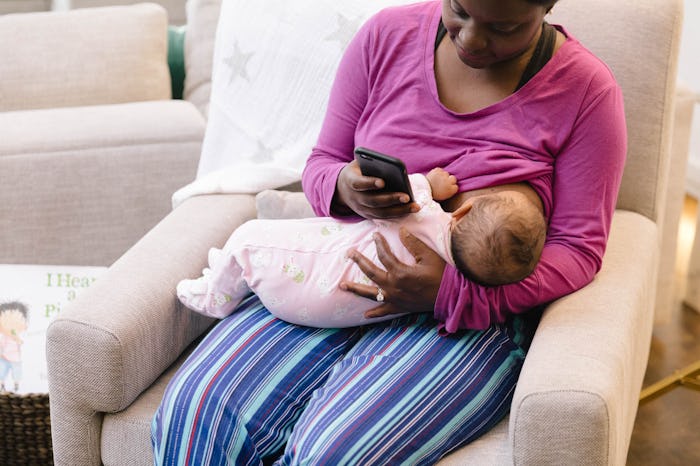Having a baby changes everything, so it's typical to feel like a completely different person postpartum. It can be hard to see how those changes are affecting you, though, especially when you're preoccupied with caring for a newborn. Don't get me wrong, I loved the snuggles, but when my partner came home I wanted to hand him the baby and hide in our bedroom for the rest of the night. In other words, I was touched out. I just didn't know it. Thankfully, there are signs you're "touched out" that your partner can be on the lookout for. After all, you deserve all the support you can get.
According to Postpartum Progress the feeling of being “touched out” at the end of what is probably a very long day caring for a baby or toddler is normal and relatively common among new parents. But sometimes you have no idea that it's happening. Instead, you just feel "wrong," completely burned out, or not like yourself. As Carolyn Wagner, MA, LPC, a Chicago-area therapist specializing in maternal mental health, explains in Mother.ly, that's because the feeling of being touched out actually has little to do with being touched. Instead, it's more about having a new baby that is dependent on you for everything. For some moms, being touched out is also a warning alarm that they need a break, some self-care, or to be touched in a way that's not related to keeping another human being alive. For others, it can manifest itself into a deep desire to not want to be touched by anyone, including a romantic partner. Unfortunately, it can be hard to understand what's happening, especially when you feel like you are supposed to enjoy every moment of being a mom.
If your partner is showing signs of being "touched out," it might be time for a gentle conversation about it. They might not realize it, but the mom in your life could need your help.
They Need More Alone Time Than They Used To
Does your partner hand you the baby and literally run to the bedroom or bathroom for alone time as soon as you walk in the door from work? If so, they might be touched out. According to Parenting coach Sarah Rosensweet, this feeling can be even more overwhelming for introverted moms, although it can definitely impact extroverts, too.
One clue that your partner is touched out is a drastic change in their personality. If their pre-pregnant self was an extrovert or thrived on physical affection before having a baby, but now they're turning inward and not wanting to be touched, they're probably touched out. Sometimes it takes our partner to mention that we seem different in order for us to realize there's a problem.
They Aren’t Interested In Sex
According to Postpartum Progress, feeling touched out sometimes manifests as a complete lack of desire for sex. As postpartum sexuality researcher Sofia Jawed-Wessel, Ph.D. told SELF, many new moms feel pressured to have sex after the six-week wait but find themselves uninterested or even turned-off by the idea of physical intimacy. "All of this can be quite a challenge, and sex is likely not a priority and that’s OK," Jawed-Wessel says.
New moms deserve space, privacy, and autonomy, and absolutely shouldn’t feel ashamed if they aren't ready to have sex. But since it’s possible that being touched out is more about needing a break, and not actually related to their sexual desire, having a gentle conversation about sex is sometimes necessary to get to the bottom of the issue and find ways to be intimate that work for both of you.
They Seem Stressed Out
Wagner advises new moms to see being "touched out" as less about touch and more about your body trying to tell you that you need a damn break. The problem is you can't always see how exhausted and over-extended you are.
If your partner looks exhausted and stressed out, say something. Try offering them some time, space, and a break from being a parent 24 hours a day, seven days a week. As a partner, co-parent, or support person it's your job to help them adjust to the physical and emotional demands of motherhood, and without feeling like there's something wrong with them.
They Don't Want Any Physical Intimacy
New moms might feel so "touched out" that they stop all physical contact with everyone. As Dr. Christiane Manzella explains to SheKnows, "From breastfeeding to rocking a fussy baby, it can be so physically intimate and emotionally demanding that you may not want to be touched any more than you already are. You may be in physical pain, or you may feel claustrophobic. You may also just feel protective of your body. These are all normal reactions."
The problem with this strategy, according to Dacher Keltner, a professor of psychology at University of California, Berkeley, is that physical contact with other humans is necessary for your wellbeing.
Wagner advises that you try a bit of "immersion therapy" to re-introduce positive emotions around touch into your life that are completely unrelated to caring for your baby — like accepting a joyful hug from your child or a kiss from your partner.
